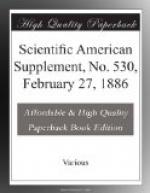A quotation from Mr. Sibley’s address to the students of Sibley College, during a recent visit to Ithaca, is illustrative of his practical thought and expression, and a fitting close to this brief sketch of his practical life: “There are two most valuable possessions which no search warrant can get at, which no execution can take away, and which no reverse of fortune can destroy; they are what a man puts into his head—knowledge; and in to his hands—skill.”—Encyclopaedia of Contemporary Biography.
* * * * *
Hydrastis in dyspepsia.—Several correspondents in The Lancet have lauded hydrastis as a most useful drug in dyspepsia.
* * * * *
THE ETHICS OF ENGINEERING PRACTICE.
At the Pittsburg meeting of the American Institute of Mining Engineers, held from the 16th to the 19th of February, Mr. James C. Bayles, the President, delivered the following address:
Gentlemen of the Institute: Having availed myself somewhat liberally during the past two years of the latitude which is accorded the president in the selection of the topics presented in addresses from the chair, I do not need to plead safe precedent as my warrant for devoting the address which marks the conclusion of my service in the dignified and honorable office to which, through your unmerited favor, I have been twice chosen, to the consideration of some of the questions in casuistry the answers to which will be found to furnish a basis for a code of professional ethics. It is not asking too much of the engineer that his professional morality shall conform to higher standards than those which govern men who buy and sell with no other object than the getting of gain. The professional man stands in a more confidential relation to his client than is supposed to exist between buyer and seller in trade. He is necessarily more trusted, and has larger opportunities of betraying the confidence reposed in him than is offered the merchant or the business agent. For the reason that he cannot be held to the same strict accountability which law and usage establish in mercantile business, he is under a moral obligation to fix his own rules of conduct by high standards and conform to them under all circumstances. Whatever the measure of his professional success—whether wealth and reputation crown his career, or disappointment and poverty be his constant and unwelcome companions—no taint of suspicion should attach to any professional act or utterance. Not only should we be able to write above the wreck of bright hopes, “Honor alone remains,” but upon our great and successful achievements should it be possible for others to inscribe the legend, “In honor wrought; with honor crowned.”




